Pickleball players taking to courts across Tennessee
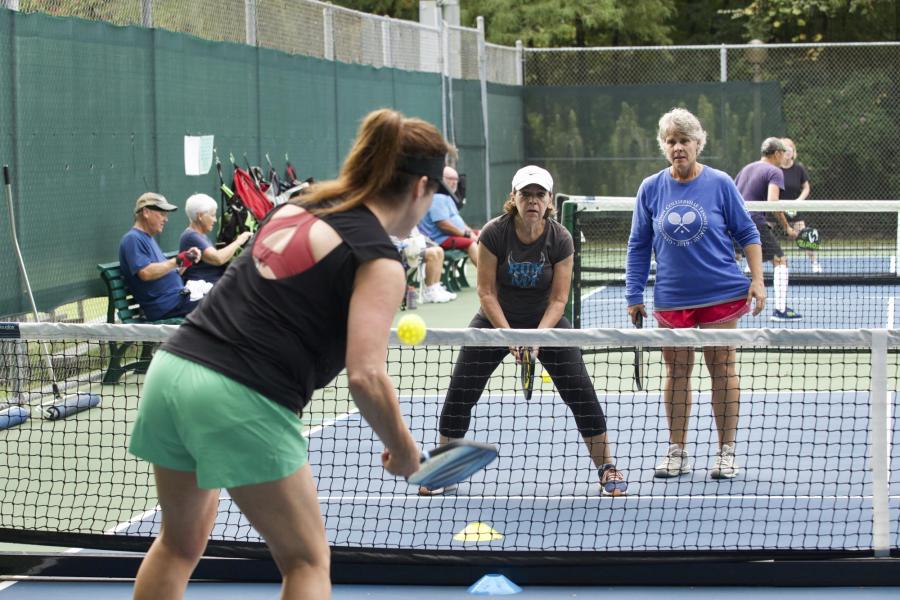
By KATE COIL
TML Communications Specialist
From Alcoa to Vonore, the sport of pickleball is taking Tennessee municipalities by storm.
A mix between tennis, racquetball, and ping pong, pickleball was invented in 1965 by the Prichard family of Bainbridge Island, Wash., who began experimenting with balls and paddles before trademarking the game in 1972. The game was named after the “pickle boat,” the nickname given to the last boat to finish the Bayview Mackinac Boat Race.
The sport uses courts somewhat smaller than the size of the tennis court and has its own set of rules. Doubles is the most popular variety, but singles games are played as well. Games often run for about 15 minutes each, and interest in the sport is increasing for all age groups.
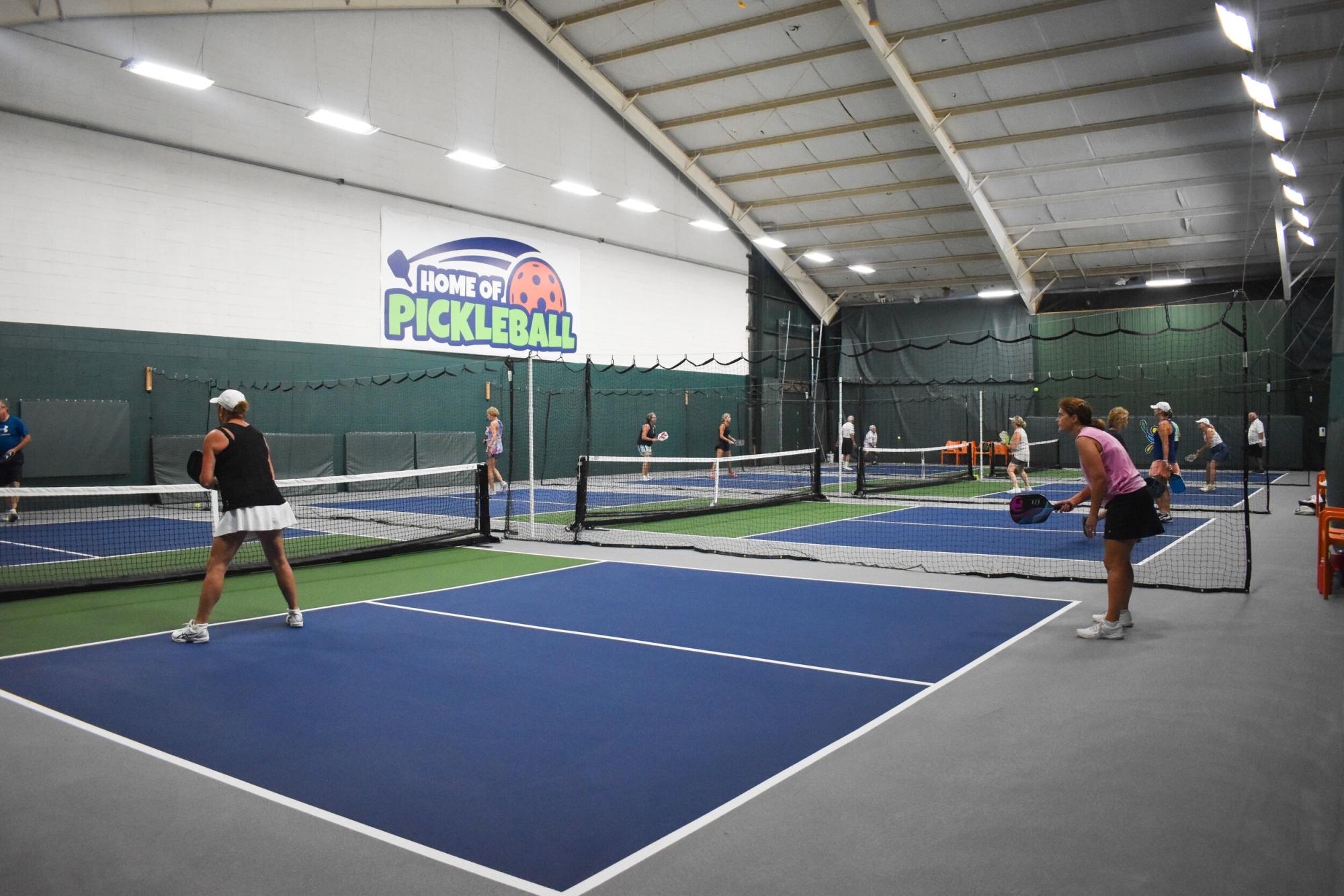
The popularity of the sport in the Pacific Northwest led to snowbirds spreading it on their annual visits to warmer climates in Arizona, California, Hawaii, and Florida. The USA Pickleball Association (USAP) was founded in 1984 and at least two U.S. championships have been held since the mid-2000s. There are also three professional pickleball leagues and two international organizations.
Pickleball had seen a 650% increase in participation in the six years prior to the COVID-19 pandemic, according to USAP. Unlike other sports, pickleball managed to keep up its momentum during stay-at-home orders. Candi Rawlins, executive director of the Tennessee Recreation and Parks Association (TRPA), said Tennessee was one of the many states seeing a surge in pickleball participation prior to and then during the pandemic
“Pickleball was starting to really ramp up right before COVID, but it has exploded since,” Rawlins said. “There are very, very enthusiastic players, and it’s always great to see people out having fun in our parks. During the pandemic, we saw anything that got people outside or that they could do and still stay apart from each other grow. We saw tremendous usage in non-contact activities, and our parks stayed open, for the most part throughout the pandemic so people were able to get outside in the fresh air, exercise, have fun, and try new things like pickleball.”
Terry Napier, director of parks and recreation for the city of Bristol, said pickleball started out as a popular activity for the over 50 set.
“We actually started offering pickleball about eight or nine years ago,” he said. “We had a couple who moved up from Florida who talked about it, and it just happened that we were redoing the basketball court at our senior center. We had the pickleball court lines painted when we redid that. Obviously, just as the pandemic hit, pickleball was blowing up everywhere. We had already started converting some of our tennis courts to meet the needs. I see a lot of 50-somethings who have gotten really into the sport, and it keeps growing and expanding. It doesn’t seem to know any age limits. Your first wave was probably ex-tennis players because it’s a similar sport with a lot of the same actions, just slower and smaller.”
In Germantown, Parks and Recreation Director Natalie Ruffin said the popularity of pickleball was also resident-driven.
“Germantown resident Mike Morgan deserves a lot of credit,” she said. “In 2019, Mike came to city staff to make us aware of the popularity of the sport. At the time, it was primarily played at some local churches, as well as at a multi-purpose court at Riverdale Park where residents painted lines down for pickleball. We knew that the sport was a big hit in the 50 and older community, but after a few tournaments were held at Johnson Road Park, we witnessed firsthand the popularity of the sport locally. Given the feedback we received from the community and our sense that the popularity was only going to grow, we knew we had to add some courts in Germantown.”
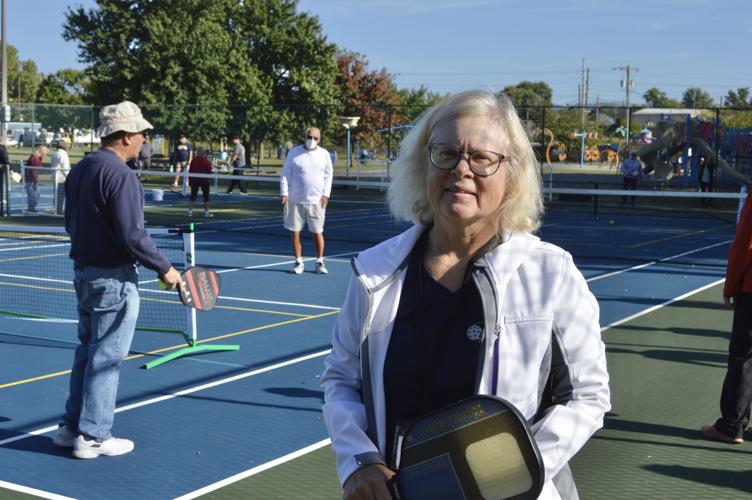
Napier said he has seen a shift in interest in the sport since it first came to Bristol about a decade ago. The city has painted pickleball courts on existing tennis courts and converted lesser-used tennis courts into pickleball courts.
“Originally, we looked at it as a cool activity for seniors because it’s a smaller court with a wooden paddle and a whiffle ball and moves a little slower,” Napier said. “However, all those same things make it an activity for everybody. You will see grandparents playing with their grandkids because the court size and the equipment is an equalizer. You have also seen coming out of the pandemic an increase in social activities.”
Germantown has also seen a post-pandemic growth in pickleball’s popularity.
“In fact, we are starting to get more and more requests for youth lessons in the community as entire families are picking up the game and going to play,” Ruffin said. “Now post-pandemic, we know the sport is growing not only in Germantown, but on a national level. We also know that we’re not the only game in town, as we’re one of many in the surrounding Memphis area that are leaning more and more into the sport. A lot of that can be attributed to the pandemic as people were looking for something to do outside that was safe and active. We noticed as soon as the courts at Cameron Brown were completed, the popularity was almost immediate.”
With the growth of the sport, many cities are looking to set aside dedicated areas for pickleball.
“Pickleball is something that we haven’t had a lot of infrastructure built for, and we are seeing that user conflict when you try to put them on tennis courts,” Rawlins said. “If a city has a strong enough group that plays all the time, they are looking for dedicated space to play pickleball.”
Before building dedicated courts, the city of Germantown allowed painted lines and taped lines at tennis courts at its Riverdale and Johnson Road parks. After hosting two tournament events, the city realized there was a desire for dedicated pickleball space.
"The popularity we witnessed with those two events and the overwhelming demand from the community, we knew we needed to invest in the sport,” Ruffin said. “Our primary facility is the eight dedicated pickleball courts at Cameron Brown Park with nets provided. In addition to that, we have three lined courts at Riverdale Park on the multi-use court in which players bring their own nets. All of that occurred in 2019 prior to the pandemic. In the midst of the pandemic, in the summer of 2020, we had the eight courts built at Cameron Brown Park.”
Ruffin said the city provides opportunities for both new and advanced pickleball enthusiasts to gather.
“The city of Germantown does not offer any league play at this time; however, due to the increasing popularity of the sport, the city is continuing to look at all options to best serve the pickleball community,” she said. “Besides open play, we do offer pickleball clinics for those looking to learn the game or those looking to hone in their skills. Also, we host a variety of tournaments throughout the year to give pickleballers the chance to compete in organized play.”
The growth of the sport has even prompted the city of Bristol to partner with a local recreation and wellness center, the Bristol SportsPlex, to build city courts on land owned by the company. The public-private partnership would include a 12-court, lighted pickleball facility at a vacant lot on SportsPlex property with the city leasing the land from the company.
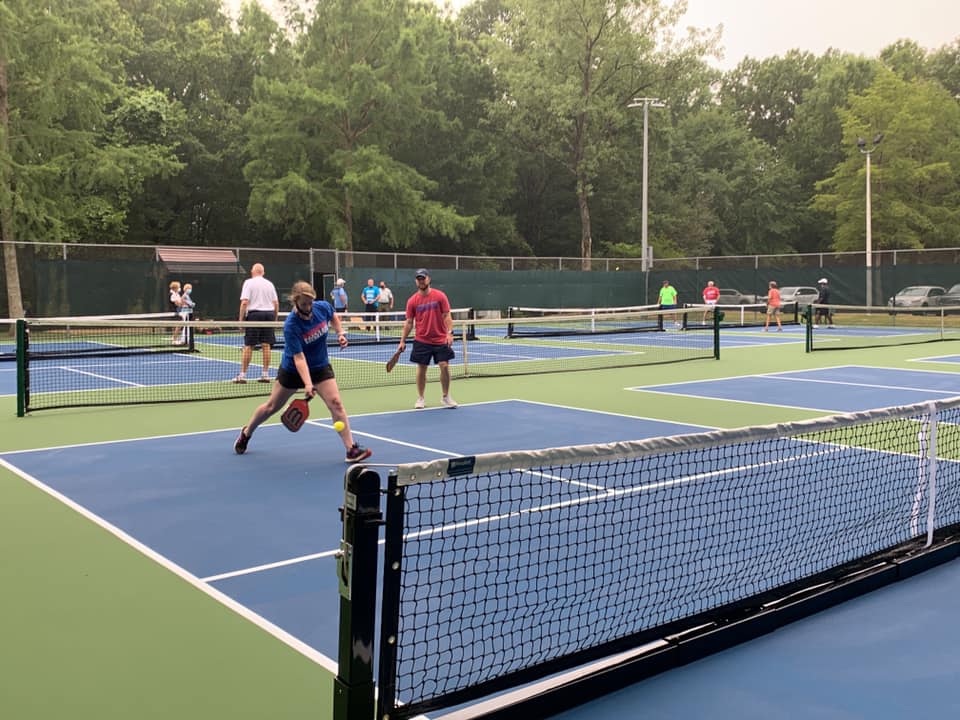
Adding to the four indoor pickleball courts and additional tennis courts inside the Sportsplex, the project would open up Bristol to having the 28-courts needed for official tournaments and make it one of the prime venues in the Southeast for such events. The project is expected to cost the city around $750,000, but would in turn generate tourism revenue from hotel stays and other business generated by tournaments.
“This property had old tennis courts, and the asphalt is still there,” Napier said. “We are just going to have to get in there and clean it up. This is a different approach, and a partnership with this company. Once it is built, we will maintain it, but they have the responsibility of conducting a certain number of tournaments and classes every year. They have the expertise to do that in-house.”
Napier said there has already been interest in tournaments in the city.
“We are seeing a lot of people come from Kingsport and Johnson City already, so we think that if we have this joint-facility where there are tennis and pickleball courts indoors and outdoors as well as a juice bar, there is one place everyone can do what they want to do,” he said. “From day-to-day, we think we will draw from the whole region. We also hope to get to the point where we are sponsoring two or three major tournaments. I would like to see a couple hundred people a few times a year who are staying in hotels and eating in local restaurants. The recreation facility is the first priority, but if you can take it a few times a year to drive the local economy, that’s a bonus.”
The sport requires minimal, inexpensive gear and the fact that it can be played outdoors increased its participation during the pandemic as well. Pickleball is now spreading to all generations. USAP has 11 registered clubs within the state of Tennessee alone.
“Sneakers, a paddle, some balls, and you’re set,” Rawlins said. “The dimensions of a pickleball court are a little smaller than a tennis court, but in a pinch, you can make a tennis court work. You can make a gymnasium work. We have people who prefer to play indoors and they can mark off courts with different colored tape lines. There is a specific type of tape that you can get for gym floors that you can put down so the lines are there but it doesn’t cause damage when you pull it up. You want a hard surface. There are portable pickleball courts with rubber sheets.”
While pickleball equipment can be bought cheaply in the sporting goods section of any big box store, Napier said those interested in the sport can opt to spend more on it.
“It’s one of those great things where you can spend as much as you want to spend,” he said. “You can go to Walmart and get a paddle and two balls off the shelf and that is all you need. We also have people who take it serio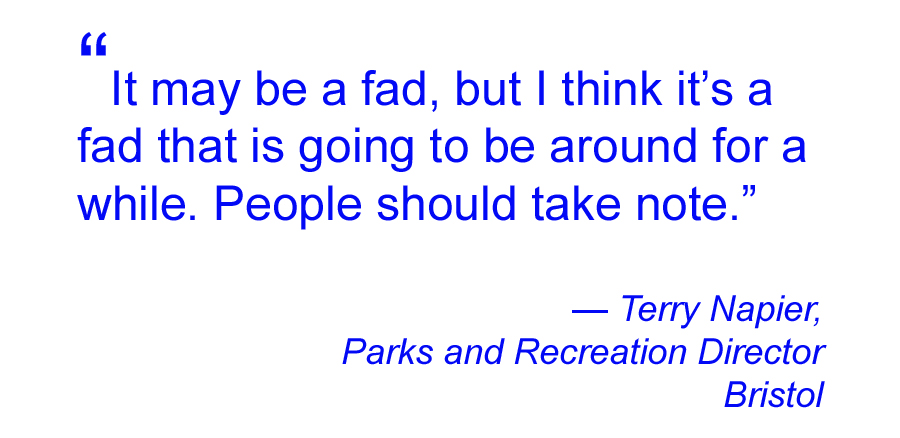 usly and spend hundreds of dollars on carbon-fiber paddles and the latest and greatest of everything, but everyone doesn’t have to do that. Because the cost is so inexpensive, we can keep stuff laying around so if anyone wants to start, they can use that.”
usly and spend hundreds of dollars on carbon-fiber paddles and the latest and greatest of everything, but everyone doesn’t have to do that. Because the cost is so inexpensive, we can keep stuff laying around so if anyone wants to start, they can use that.”
While the city isn’t leading any pickleball organizations, Napier said there are several independent pickleball groups and leagues in the city that utilize public facilities. These groups range from those just wanting a relaxed game with friends to those that are more professional and tournament-oriented.
Napier said pickleball is also a tool to help improve and promote healthy habits.
“Anything that gets people out of the house and active is something we concentrate on,” he said. “Over a two-year period, people’s habits changed, so doing things that get those habits changed back to a more active lifestyle is important. I love going by one of the tennis courts we converted to a pickleball court and seeing a group there at 10 in the morning. It’s very social, but these people are exercising, enjoying themselves, and getting back together with their social groups. It’s outside so they feel comfortable. For us, providing that opportunity so that everyone can get out and do at their level is what’s important.”
While it may be easy to dismiss pickleball as a “fad” sport, Napier said its broad appeal makes it well worth the investment.
“It may be a fad, but I think it’s a fad that is going to be around for a while,” he said. “People should take note. I think this is something that P.E. students can be doing in the gym with elementary school kids. It’s certainly something we are doing in the senior centers. That is probably what makes pickleball a gamechanger: everybody can play it. Anyone can have fun and enjoy the game. It’s a great sport for hand-eye coordination, and I think you are going to see more opportunities to play pickleball. I can build three pickleball courts for one tennis court and 12 people can play versus four.”
Ruffin said pickleball provides an important social outlet as well as recreation, which are among the reasons pickleball courts are positive investments for municipalities.
“With it being a modified version of tennis, it pulls people from that realm as well as players who may never have played tennis before,” Ruffin said. “The courts are smaller, the paddles are smaller, the ball is easier to hit, the rules are fairly easy to follow, and it's not too extraneous a sport on the body. Most importantly though, the sport lends itself to being a great social gathering for people which is probably the most prominent factor as to why the sport has grown so much.”
With a dedicated userbase, Rawlins encouraged municipalities to work with local pickleball groups to invest in the sport.
“Anything that gets outside and moving helps with health, helps reduce medical costs in our communities, and this is a sport that is accessible because it doesn’t require a lot of equipment,” Rawlins said. “It’s one of those sports that those who play it are very passionate about it, and they are very eager to share with newbies what it is and how to play. Pickleball clubs are popping up everywhere.”
